Congratulations to the 2017-2018 Executive Committee! We are honored to be working with this talented group of individuals. SECOORA Executive Committee plays an important role in sustaining our success. If you are interested in becoming a SECOORA member, click here!
Dr. Michael Crosby, Chair
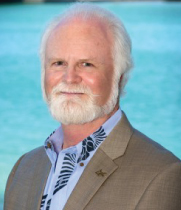 Dr. Crosby has over 30 years of diverse research, teaching, science management and leadership endeavors, including developing national policy and administrative aspects for our country’s science programs. He has developed, managed and conducted major multi-disciplinary research project and partnerships with numerous universities, national and international science and resource management agencies, programs and committees – including a U.S. Man and the Biosphere Program project entitled “Ecological and socio-economic impacts of alternative access management strategies in marine and coastal protected areas”; the U.S., Israeli and Jordanian joint partnership project entitled “The Red Sea Marine Peace Park Cooperative Research, Monitoring and Management Program”; and the Hawai‘i State EPSCoR project entitled “Pacific High Island Evolutionary Biogeography: Impacts of Invasive Species, Anthropogenic Activity and Climate Change on Hawaiian Focal Species.” Many of these endeavors focused on improving the “synthesis, translation and transfer” of science and technical information between research, public policy and stakeholder communities. In May 2013, Dr. Crosby was appointed as President & CEO of Mote Marine Laboratory and Aquarium, an independent research institution that has been a leader in marine research for 60 years. Dr. Crosby had previously served for three years as Mote’s Senior Vice President for Research. Past appointments include: Associate Vice President, Research and Economic Development, George Mason University; Vice Chancellor for Research, University of Hawai’i, Hilo; and Executive Director, National Science Board of the National Science Foundation. Dr. Crosby also is a Past-President for Sigma Xi-The Scientific Research Society, served 12 years on the Board of Governors and was past Chairman for the U.S.-Israeli Binational Science Foundation, and is currently on the Board of Directors (Past-President) for the Association of Marine Laboratories of the Caribbean, Board of Directors (Past-President) for the Pacific Congress on Marine Science and Technology, and the Institute for Venture Science Board of Advisors. Click for full bio.
Dr. Crosby has over 30 years of diverse research, teaching, science management and leadership endeavors, including developing national policy and administrative aspects for our country’s science programs. He has developed, managed and conducted major multi-disciplinary research project and partnerships with numerous universities, national and international science and resource management agencies, programs and committees – including a U.S. Man and the Biosphere Program project entitled “Ecological and socio-economic impacts of alternative access management strategies in marine and coastal protected areas”; the U.S., Israeli and Jordanian joint partnership project entitled “The Red Sea Marine Peace Park Cooperative Research, Monitoring and Management Program”; and the Hawai‘i State EPSCoR project entitled “Pacific High Island Evolutionary Biogeography: Impacts of Invasive Species, Anthropogenic Activity and Climate Change on Hawaiian Focal Species.” Many of these endeavors focused on improving the “synthesis, translation and transfer” of science and technical information between research, public policy and stakeholder communities. In May 2013, Dr. Crosby was appointed as President & CEO of Mote Marine Laboratory and Aquarium, an independent research institution that has been a leader in marine research for 60 years. Dr. Crosby had previously served for three years as Mote’s Senior Vice President for Research. Past appointments include: Associate Vice President, Research and Economic Development, George Mason University; Vice Chancellor for Research, University of Hawai’i, Hilo; and Executive Director, National Science Board of the National Science Foundation. Dr. Crosby also is a Past-President for Sigma Xi-The Scientific Research Society, served 12 years on the Board of Governors and was past Chairman for the U.S.-Israeli Binational Science Foundation, and is currently on the Board of Directors (Past-President) for the Association of Marine Laboratories of the Caribbean, Board of Directors (Past-President) for the Pacific Congress on Marine Science and Technology, and the Institute for Venture Science Board of Advisors. Click for full bio.
Rick DeVoe, Vice-Chairman
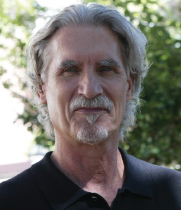 Rick DeVoe joined the S.C. Sea Grant Consortium in 1980, its inaugural year, and has served as its Executive Director since 1997. Rick is also a member of the Graduate School Advisory Board and the Marine Biology Council of the Graduate Program in Marine Biology at the College of Charleston, and the Board of Advisors for the Center for Marine and Wetland Studies at Coastal Carolina University. Rick serves as Co-Chair of the Board on Oceans, Atmosphere, and Climate with the Association of Public and Land Grant Universities (APLU), and is a member of the Executive Planning Team for the Governor’s South Atlantic (Ocean) Alliance, the S.C. Regulatory Task Force for Coastal Clean Energy, the Gullah/Geechee Sea Island Coalition Think Tank, and the Charleston (S.C.) Resiliency Network Steering Committee, among other appointments and affiliations. Rick’s professional interests focus on coastal and marine resource policy, state and regional coastal ocean planning and policy, ocean observing, marine aquaculture policy, coastal resiliency, science-to-application linkages, and science communication and education. He earned his undergraduate degree from Fairleigh Dickinson University and graduate degrees from CUNY/City College of N.Y. and the University of Rhode Island.
Rick DeVoe joined the S.C. Sea Grant Consortium in 1980, its inaugural year, and has served as its Executive Director since 1997. Rick is also a member of the Graduate School Advisory Board and the Marine Biology Council of the Graduate Program in Marine Biology at the College of Charleston, and the Board of Advisors for the Center for Marine and Wetland Studies at Coastal Carolina University. Rick serves as Co-Chair of the Board on Oceans, Atmosphere, and Climate with the Association of Public and Land Grant Universities (APLU), and is a member of the Executive Planning Team for the Governor’s South Atlantic (Ocean) Alliance, the S.C. Regulatory Task Force for Coastal Clean Energy, the Gullah/Geechee Sea Island Coalition Think Tank, and the Charleston (S.C.) Resiliency Network Steering Committee, among other appointments and affiliations. Rick’s professional interests focus on coastal and marine resource policy, state and regional coastal ocean planning and policy, ocean observing, marine aquaculture policy, coastal resiliency, science-to-application linkages, and science communication and education. He earned his undergraduate degree from Fairleigh Dickinson University and graduate degrees from CUNY/City College of N.Y. and the University of Rhode Island.
Dr. George Maul, Treasurer
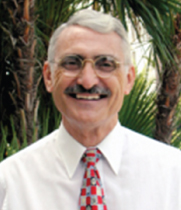 George A. Maul earned his Bachelor of Science degree (with honors) from the New York Maritime College at Fort Schuyler, and was licensed a U.S. Merchant Marine Officer; he received his doctorate in physical oceanography from the University of Miami, where he later taught as Adjunct Professor of Meteorology and Physical Oceanography. George served 9 years as a commissioned officer in the U.S. Coast and Geodetic Survey, and 25 years as a research oceanographer with the National Oceanic and Atmospheric Administration where he received 3 Distinguished Authorship Awards. Dr. Maul currently is professor of oceanography at the Florida Institute of Technology, and for 20 years was department head of Marine and Environmental Systems; he is a recipient of Faculty Senate Excellence Awards for Service, and for Teaching. He has been chief scientist on numerous oceanographic cruises, and has published over 200 refereed articles and book chapters on oceanography and meteorology, editorials, technical reports, refereed abstracts, and books. He is a Fellow of the Marine Technology Society, a Fellow of the American Meteorological Society, and the 2016 Florida Academy of Sciences Medalist.
George A. Maul earned his Bachelor of Science degree (with honors) from the New York Maritime College at Fort Schuyler, and was licensed a U.S. Merchant Marine Officer; he received his doctorate in physical oceanography from the University of Miami, where he later taught as Adjunct Professor of Meteorology and Physical Oceanography. George served 9 years as a commissioned officer in the U.S. Coast and Geodetic Survey, and 25 years as a research oceanographer with the National Oceanic and Atmospheric Administration where he received 3 Distinguished Authorship Awards. Dr. Maul currently is professor of oceanography at the Florida Institute of Technology, and for 20 years was department head of Marine and Environmental Systems; he is a recipient of Faculty Senate Excellence Awards for Service, and for Teaching. He has been chief scientist on numerous oceanographic cruises, and has published over 200 refereed articles and book chapters on oceanography and meteorology, editorials, technical reports, refereed abstracts, and books. He is a Fellow of the Marine Technology Society, a Fellow of the American Meteorological Society, and the 2016 Florida Academy of Sciences Medalist.
Dr. Jeff Copeland, Secretary
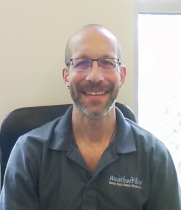 Dr. Jeffrey Copeland is Chief Scientist at WeatherFlow Inc. (since 2013), a leader in the private sector weather industry, with experience in applying the latest in observational, modeling, and forecasting technology to solving its clients’ most challenging problems in the consumer, financial, energy, and government sectors. He has over 20 years of experience working in government and private industry. His current research is on the landfall effects of Gulf and Atlantic tropical systems. Prior to his position at WeatherFlow he spent a decade at the National Center for Atmospheric Research with earlier positions at Mission Research Inc., National Institute of Water & Atmospheric Research (New Zealand), and USGS Water Resources Division. Jeff received his B.Sc. from McGill University, M.Sc. from UCLA, and Ph.D. in Atmospheric Science from Colorado State University.
Dr. Jeffrey Copeland is Chief Scientist at WeatherFlow Inc. (since 2013), a leader in the private sector weather industry, with experience in applying the latest in observational, modeling, and forecasting technology to solving its clients’ most challenging problems in the consumer, financial, energy, and government sectors. He has over 20 years of experience working in government and private industry. His current research is on the landfall effects of Gulf and Atlantic tropical systems. Prior to his position at WeatherFlow he spent a decade at the National Center for Atmospheric Research with earlier positions at Mission Research Inc., National Institute of Water & Atmospheric Research (New Zealand), and USGS Water Resources Division. Jeff received his B.Sc. from McGill University, M.Sc. from UCLA, and Ph.D. in Atmospheric Science from Colorado State University.
Dr. Quinton White, Past Chair
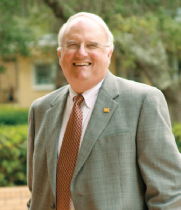 A. Quinton White, Jr., Ph.D., is Executive Director, Marine Science Research Institute and Professor of Biology and Marine Science at Jacksonville University. The Marine Science Research Institute building opened in 2010 and is the first LEED certified Gold building on the JU campus. Dr. White joined the faculty at Jacksonville University in 1976, having completed his Ph.D. at the University of South Carolina at the Baruch Institute for Marine Biology and Coastal Research. Dr. White has written numerous research and technical papers or reports and received grants and contracts to support marine research at JU. Currently he is conducting research on the history of human impact on the Florida environment and especially on the St. Johns River with a focus on manatees and water quality issues. Dr. White has been active in the Jacksonville community and writes a monthly column in the Florida Times-Union called “River Life”. He is President-elect of the Southern Association of Marine Labs. Recent awards have included Florida Wildlife Federation Marine Conservationist of the Year in 2015, the Regional Leadership Award from the Northeast Florida Regional Council and the City of Jacksonville’s Christi P. Veleta Environmental Award in 2014. He was honored by Leadership Jacksonville in 2011 as a Community Trustee. In 2010 he received the City of Jacksonville Mayor’s Environmental Achievement Award.
A. Quinton White, Jr., Ph.D., is Executive Director, Marine Science Research Institute and Professor of Biology and Marine Science at Jacksonville University. The Marine Science Research Institute building opened in 2010 and is the first LEED certified Gold building on the JU campus. Dr. White joined the faculty at Jacksonville University in 1976, having completed his Ph.D. at the University of South Carolina at the Baruch Institute for Marine Biology and Coastal Research. Dr. White has written numerous research and technical papers or reports and received grants and contracts to support marine research at JU. Currently he is conducting research on the history of human impact on the Florida environment and especially on the St. Johns River with a focus on manatees and water quality issues. Dr. White has been active in the Jacksonville community and writes a monthly column in the Florida Times-Union called “River Life”. He is President-elect of the Southern Association of Marine Labs. Recent awards have included Florida Wildlife Federation Marine Conservationist of the Year in 2015, the Regional Leadership Award from the Northeast Florida Regional Council and the City of Jacksonville’s Christi P. Veleta Environmental Award in 2014. He was honored by Leadership Jacksonville in 2011 as a Community Trustee. In 2010 he received the City of Jacksonville Mayor’s Environmental Achievement Award.
Related news
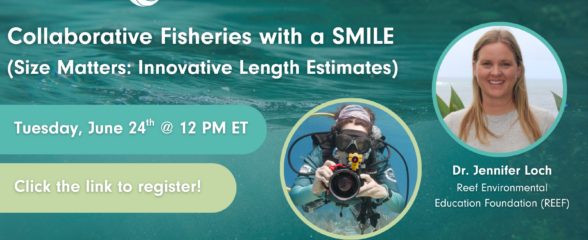
SECOORA Webinar: Collaborative Fisheries with a SMILE (Size Matters: Innovative Length Estimates)
On Tuesday, June 24th at 12 PM ET, Dr. Jennifer Loch from Reef Environmental Education Foundation (REEF) will discuss the SMILE (Size Matters: Innovative Length Estimates) project as part of SECOORA's Coastal Observing in Your Community Webinar Series.
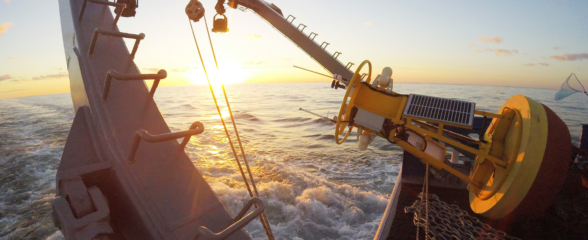
Funding Cuts to NOAA IOOS Will Hurt the Southeast
Proposed federal funding cuts would eliminate the IOOS Regional Observations budget for next year. Contrary to the budget Congress has already approved for this year, the Executive Branch wants these proposed cuts to go into effect in 2025.
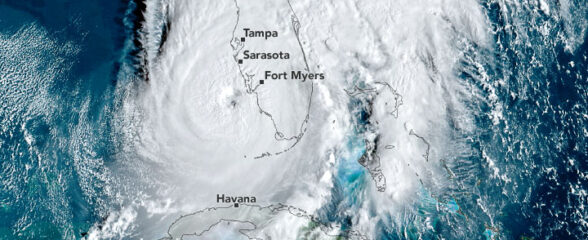
SECOORA Webinar on the Rapid Intensification of Hurricane Ian: Warm Subsurface Water on the Wide Continental Shelf
Join us Thursday, April 24th at 12 PM ET for the April installment of the SECOORA Coastal Observing in Your Community Webinar Series! This month, we will hear from Dr. Yonggang Liu from the University of South Florida. He will discuss his research on the rapid intensification of Hurricane Ian in relation to anomalously warm subsurface water on the wide...